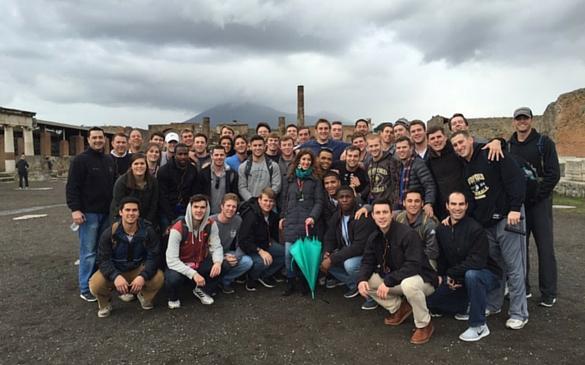By: Katie Sanders, Staff Writer
In 2014, Open Doors, an annual report published by the Institute of International Education in New York, ranked Wofford College fourth in the country for the percentage of undergraduates receiving credit for courses abroad. The college’s slogan, “it’s your world,” emphasizes the value placed on the multi-cultural educational experience, but not all students find it so easy to pack their bags and board a plane.
Student athletes in particular do not have as many opportunities to study abroad because of conflicting seasons and training schedules.
Mark Line, senior associate athletics director for sports programs, assures that the Athletics Department has the same goals for the students as the rest of college.
“The Athletic Department supports the study abroad program and is very aware of its importance to our students and the College,” he says. “Our coaches work with their students as best they can to make this an option for them.”
“Historically speaking, our coaches have been very supportive,” agrees Amy Lancaster, dean of international programs. She adds that athletes can arrange to train abroad if necessary.
“All of our programs can talk with students about training opportunities, as long as they are compliant with NCAA regulations,” she says. “We have many students who take advantage of gym facilities abroad to train individually.”
Lancaster admits that it’s fair for the Athletics Department to consider whether missing a semester of a sport disqualifies an athlete from returning the next season. Line says certain sports are more flexible than others.
“The teams that have the most difficulty making it work are the teams that have competition in both fall and spring semesters, for example basketball and golf,” he says. “One of the options for fall sports is to go abroad in the spring semester of their senior year when they are not in competition. Some choose to do that.”
Last interim, the Wofford College baseball team traveled together to Italy for two weeks. Sophomore member Adam Scott recommends the experience to all athletic teams.
“Without a doubt, it benefitted our team,” he says. “We were all given the opportunity of a lifetime, while also being able to become even closer brothers… If it is at all possible, every team should try to do the same sort of thing.”
Other athletes also see traveling with their team as a way to reconcile athletics with an abroad experience. Katy Funk, junior on the women’s golf team, feels she is not able to have an abroad experience like other students, due to her team’s rule about how long its members can be gone.
“I do think [studying abroad as a team] should be offered for more teams,” she says. “My coach is working on a trip for the team, but she was unaware of the lengthy process. The opportunity will not be available to the current junior class, Allyson Markiewicz and I, which is super unfortunate because during our freshman year the rule was made that we can only travel 10 days during interim. Allyson and I are both looking for interims that are only 10 days, but the shorter trips normally don’t go to as exotic or far away places.”
However, Lancaster says she would not want all athletic teams to start traveling together, for fear it would compromise the experience.
“I am thrilled that our baseball team got to study abroad. Having said that, I would love for students to be able to choose programs that meet their own individual goals and interests. I would say that for any student group,” explains Lancaster. “If it’s the difference between not going abroad, I would much rather them have that experience as a team. I just wouldn’t want every single student organization to then start traveling together- I think it happens enough informally. There is a lot of value in the branching out that happens when you study abroad.”
For some athletes, though, it may be the difference between not going abroad. Jordan Bolds-Lockwood, junior football player, says he could only go after his football career is over. While football is important to Bolds-Lockwood, he does not think it should mean giving up the abroad experience.
“I believe that athletes should not have to give up the opportunity to go abroad… Perhaps their time at Wofford is the only opportunity some athletes will have to travel,” he explains. “It may be difficult depending on the sport, but it’s possible no doubt. I think it’s essential to try to go abroad because it’s an amazing experience that should not be missed for any reason.”
Lancaster says that overall, her job in the international affairs office is to send more students abroad so they can have more meaningful experiences. She is open to exploring new ways to make that happen, even for athletes with complicated situations.
“We want to dispel the myth that if you’re an athlete going abroad is not possible,” she states. “I do not want them to think it’s not possible.”






























